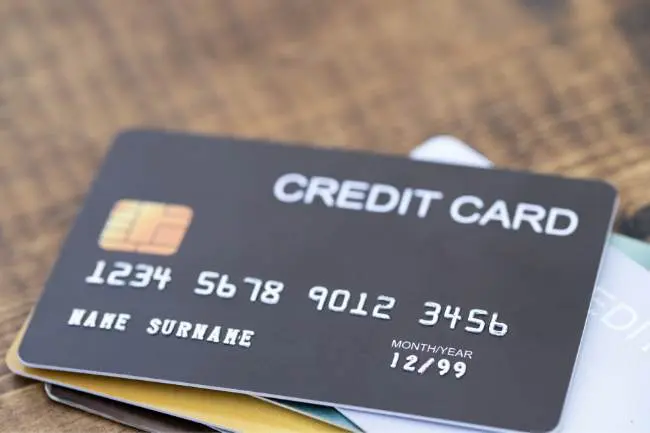Business Credit Cards are important to easily manage the company’s finances, increase the credit profiles, and thereby enhance efficiencies in operation. In this regard, this manual concerns business credit cards, with a major focus on the importance and usability of the card in ensuring smooth business operation.
- What is a Business Credit Card?
- How does a business credit card work?
- Significant Business Credit Card Benefits
- Why Use a Business Credit Card?
- Common Uses of Business Credit Cards
- Who Can Apply for Business Credit Cards?
- Difference Between Business Credit Card and Corporate Credit Card
- Pros of Business Credit Cards
- Cons of Business Credit Cards
- How to Choose the Right Business Credit Card in Canada
- Compare Canada Business Credit Cards: Major Features to Consider
What is a Business Credit Card?
A Business Credit Card refers to a credit card meant for businesses and not for personal use. Against this, personal credit cards are for individual use and are meant for personal expenses. Business credit cards are meant for a wide range of business transactions, meaning that both startups and established big corporations can use them.
Between Business Credit Card vs. Personal Credit Card
The major difference between personal and business credit cards is their usage and features. Business cards tend to have higher credit limits in comparison to the other and often have customized features that help in tracking expenses. Therefore, ensuring that a business keeps clear records of financial transactions.
Business credit cards can also build an independent credit history for a business owner different from that of personal credit, especially for businesses with aspirations to grow further.
How does a business credit card work?
How to apply for a business credit card? Most applications for a business credit card look much like a personal credit card but with a few different questions posed. Most credit card issuers need to know details regarding the business. These details include revenue, type, and structure of a business in addition to the owner’s information to make a credit decision. This allows them to have a business profile to analyze for a credit decision.
Eligibility Criteria for Business Credit Card
Most business credit card companies require that a company has been around for a longer time and has a better credit score, but there are plenty of options available for startup business credit card companies with no credit. And no credit check business credit card choices for businesses that are just starting.
For these reasons, a business credit card is a central financial tool for any new business, as many cards don’t require an in-depth credit history or even an employer identification number (EIN) to qualify.
Business Credit Card Limits and Rates
Differences in credit limits and interest rates on business credit cards can be significant. Generally, they have higher limits attached to them, because the magnitude of spending requirements is greater for businesses compared to the usage magnitude of personal cards. This means that they might also carry slightly higher interest rates, owing to the potential increased risk of lending to businesses.
Importantly, businesses should understand the terms of their credit facilities, especially in those cases where the card might have different benefits such as cashback on office supplies, travel perks, or introductory 0% interest rates for periods.
Significant Business Credit Card Benefits
Business Credit Cards can help you manage your company’s finances. Here are some key benefits:
1. Easier Expense Management and Separation of Personal from Business Expenses
The major benefit of a business credit card is to ease you into handling all the expenses and further categorize business costs from what you are spending for personal use. Separating personal from business expenses will reduce your accounting tasks and save you some time while sorting through receipts. This practice is quite important if you want an easier time during the tax season tracking expenses that are deductible and preparing clear financial statements.
2. Build a Good Credit History for Your Business
A business credit card will offer a better way to build a good credit history for your business. Just as with personal credit, a strong business credit profile may lead to better financing options and terms. Proper use of the business credit card on a tallied and regular basis helps in building a strong credit score, which you can leverage against loans, get investors, and negotiate better terms with suppliers. This is a great help, especially for new startups and small-scale businesses that have to create creditworthiness totally from scratch.

3. Potential Benefits and Perks: Cashback and Travel
Business credit cards usually come with sweet rewards and perks. Thus, business cards will tend to offer the likes of cash back on things you will frequently spend money on. Travel benefits in terms of airline miles or discounts on hotels and even sign-up bonuses. For example, most Canadian business credit cards offer highly rewarding office supplies, travel expenses, and dining. The rewards pile up pretty fast and so do the savings and benefits that accrue to the business.
Why Use a Business Credit Card?
There are many good reasons to use a company credit card, especially for a new startup or small business.
For Startups and Small Businesses
Business credit cards can enable startups to gain indispensable financial flexibility. For a start-up business, without an extensive credit history, there are some startup business credit cards with no credit check or startup business credit cards with no credit.
These cards can offset any restrictions to funding potential start-up businesses might encounter. It helps manage startup expenses and keeps adequate cash flow in the business to grow the startup business without financial stress.
Small businesses get similar advantages. Small business credit cards like small business credit cards for LLCs or small business credit cards in Canada come with features like higher credit limits, more employee cards, and detailed expense tracking. These features help small businesses distinctive financial needs, thus helping streamline faster and more effective operations.
Examples of How Business Credit Cards Can Help with Finances
Think of a startup that requires inventory but hasn’t been paid by its customers yet. The business card can bridge this gap and provide the needed funds to keep the business running until the revenues start to flow in.
In the same light, a small business that wants to expand its operations can use the card to seek financing of new equipment or marketing campaigns and leverage its credit line to do this and support these growth initiatives.
For instance, a tech startup may utilize a no-credit-check business credit card to purchase the latest software and hardware required for development purposes. Another good case would be a restaurant chain that uses a Canada business credit card to get cashback on bulk food purchases that help cut operational costs.
Common Uses of Business Credit Cards
A business credit card is a flexible, multipurpose financial tool that can be used in several ways, including those listed here:
1. Day-to-Day Business Expenses
One of the most common uses of business credit is to pay for everyday business expenses. Examples of these types of expenditures include office supplies, utilities, and other common expenses.
Running these types of expenditures on the card helps businesses maintain their cash flow and secure payment cycles to manage their finances more effectively.
For example, a small retail shop may use a business credit card to purchase stock and pay for the utility bill. This not only aids in tracking business expenditures but also collects rewards that can be invested back into the business.
2. Managing Travel Expenses
Traveling in business often leads to expenses that some people may not be very comfortable with. However, a business credit card provides a solution to this challenge. Indeed, much will be put into managing these prices more efficiently.
Many business credit cards offer travel-related perks. These perks include discounts on air travel, hotel stays, and airport lounges. The benefits of such usage added to the improvement of employees’ travel experience are a reduction in the number of bills a company gets from a travel agency.

3. Employee Spending
Business credit cards facilitate better management of employee spending. The business can issue cards to its employees, easily monitoring their spending and limiting the amount they can spend.
That way, you can be sure that all purchases made are required and within the budget at hand. This is quite important, particularly for sales teams or companies whose employees travel often.
For instance, a consulting firm with traveling consultants can issue small business credit cards to manage travel expenditures. The cards can be used to book flights and make hotel accommodations and meal payments, while the company tracks all expenditures through detailed statements provided by the credit card issuer.
Who Can Apply for Business Credit Cards?
Business credit cards are targeted for all kinds of business structures, right from sole proprietors to large corporations. Let’s explore this in more depth.
Eligibility Criteria
- Sole Proprietors: Owners who operate their own business can fill out an application to earn a business credit card based on their personal Social Security number. Most appropriate for individuals like freelancers and small business owners who run a business singularly.
- Partnerships: Businesses with more than one owner can fill out an application based on their partnership’s Employer Identification Number (EIN) and other necessary business information.
- Limited Liability Companies (LLCs) and Corporations: Companies can be eligible for business credit cards if they produce detailed financial information and demonstrate a committed history of using credit responsibly.
Importance of Credit History and Business Financials
A good credit history and sound business financials form the basic requirement for acquiring a business credit card. Lenders look at personal as well as business credit scores to determine the eligibility of the applicant and to set credit limits.
Some options are even available for newer businesses or start-up ventures, like that of a startup business credit card with no credit or no credit check business credit card. In which no business credit history has been established. Yet, a reliable cash flow and good financial management will always be crucial factors taken into consideration when your approval and terms are on the line.
Difference Between Business Credit Card and Corporate Credit Card
Better you know the distinction between business credit cards and corporate credit cards before you decide the right one for your organization.
1. Comparative Analysis of Features, Eligibility, and For Whom
- Business Credit Cards: These are cards for smaller to medium-sized businesses. Most business credit cards require what is known as a personal guarantee, meaning the business owner personally guarantees to pay the debt. Business credit cards are usually loaded with cashback, travel rewards, and expense-tracking tools. Corporate credit cards are good for small businesses and startups because of their small number of employees and their details.
- Corporate Credit Cards: Corporate credit cards are credit cards used by large corporations with high annual revenues. Using a corporate card doesn’t require any personal guarantee. The company itself underwrites the debt. Corporate cards come with a huge credit amount with detailed reporting and very high credit limits, along with customized spending controls. It is very helpful for large-scale operations with many employees.
2. Specific Scenarios Where One May Be Preferred Over the Other
- Small Businesses and Startups: Small business or startup business credit cards are the correct choices for small businesses or startups. Small business credit cards offer application requirements that are indeed accessible and are packed with beneficial features that hold significance in helping small businesses manage their expenses and build credit.
- Large Corporations: Corporate cards are more beneficial for large organizations because they offer features in detail, hold far higher credit limits, and do not mix debt with the personal credit score of a business owner.
Pros of Business Credit Cards
Business credit cards can provide businesses with several advantages that would otherwise be unavailable. Specific Advantages Include:
- Improving Cash Flow Management: Businesses can maintain their liquidity by using a business credit card to defer payments until the end of the billing cycle. It is especially valuable for businesses with cyclical costs or those that usually require cash reserves.
- Financial Flexibility: A business credit card represents revolving credit and can cover any number of business expenses, offering a business owner financial freedom to manage cash flow on their terms. This is especially valuable to cover short-term financing gaps in operations or significant acquisitions.
- Expense Tracking: Expenses can be tracked and categorized separately through the available tools with a business credit card, reducing the hassle of bookkeeping and tax preparation. Business owners also get to monitor their employees’ spending and set limits that ensure proper spending control.

Cons of Business Credit Cards
While business credit cards provide many advantages, there are also some disadvantages. General Disadvantages Include:
- Higher Interest Rates: A business credit card carries a relatively higher rate of interest compared with traditional business loans.
- Personal Guarantee: Most business credit cards require businesses to offer a personal guarantee, meaning the business owner is personally responsible for the debt. This can affect your personal credit rating and burden.
- Less Consumer Protection: Business credit cards offer the business owner or user less protection than a personal credit card. For instance, they may not have the same type of regulatory protections provided by, say, the Credit Card Accountability Responsibility and Disclosure Act (CARD Act) in the United States.
Weighing these pros and cons, a business can determine if having a business credit card is the best financial choice for their company. Like any tool, a business credit card can offer many advantages if you incorporate it into your approach.
But it is also smart to be aware of some of the possible drawbacks of a business credit card so that you can choose a card that can meet the specific needs and goals of your business.
How to Choose the Right Business Credit Card in Canada
There are a few main factors that you need to be thinking about when you are determining the right credit card for your business in Canada. Some cards can provide great advantages, such as improved cash flow management, rewards, and expense tracking, that are specifically designed to your business’s unique needs and size.
Factors to Consider Across Business Size and Needs
Through analyzing different factors below, one can be able to select the right card for either a startup or a going concern.
- Business Size: The size of your business greatly impacts the type of credit card you’ll want to choose. Small business credit cards in Canada target small enterprises with fewer workers and lower monthly expenditures. They commonly offer lower credit limits and basic expense-tracking utilities. For larger businesses, cards with larger credit limits and more comprehensive management utilities would be more appropriate.
- Credit History: The credit history of your business plays a gargantuan role in determining the eligibility of various cards. Startup business credit cards with no credit or startup business credit cards EIN only can be appropriate for new businesses without an existing credit history. These do not involve heavy credit checks and build your business credit by providing for your constant power of borrowing.
- Spending Habits: Monitor the occurring spending habits of your business. If your business involves lots of travel expenses, then look for cards with better travel rewards and perks. In the same way, if you have to make office supplies or equipment purchases often, then an appropriate card will give cash-back offers on the same, benefiting your business to the maximum.
- Annual Revenue: Higher revenues may get a business premium qualification card that has higher limits and half-decent rewards. While it is more common to have a limit on the card, since limits generally increase with better cards, higher limits on the card have an impact on higher annual fees. Keep that in mind.
- Employee Needs: Should you find yourself in a position where the organization demands that more than one employee be given access to the credit card, then you will want to see what cards have a free additional employee card—preferably with customizable limits. This aspect helps you monitor employee expenses and keep control over your company’s budgeting.
Compare Canada Business Credit Cards: Major Features to Consider
- Cards with No Annual Fees: Particularly suitable for cost control within businesses, business credit cards with no annual fees are ideal for start-ups or small companies within their budget. While these cards often offer fewer features than their fee-based counterparts, they still provide substantial value.
- Lower APR: The APR is one of the most critical factors to consider when applying for a business credit card, especially if there’s a chance you won’t be able to pay off the balance in full every month. Small business credit cards with lower interest rates can save your business significant money on interest charges. Be sure to compare the APRs of different cards.
- Reward Programs: The nature of reward programs on business credit cards varies significantly. Look into credit cards with rewards most beneficial to your business:
- Cashback Rewards: Ideal for businesses with regular expenditures in specific categories such as office supplies, travel, or dining. Cashback rewards can be reinvested into the business, providing additional financial benefits.
- Travel Rewards: If your business involves frequent travel, consider cards that offer points or miles for travel expenses. These rewards can be redeemed for flights, hotel stays, and other travel-related expenses, reducing overall travel costs.
- Sign-Up Bonuses: Some business credit cards offer lucrative sign-up bonuses. Ensure the spending requirements to earn the bonus align with your business’s usual spending habits.
- Expense Management Tools: Very beneficial for businesses with multiple employees, comprehensive expense management tools make it easy to track and categorize expenses, simplifying bookkeeping and financial reporting. Cards that integrate with accounting software can further streamline your financial processes.
- Other Benefits: Consider other perks that may benefit your business, such as purchase protection, extended warranties, and travel insurance. These additional benefits can provide extra value and security for your business purchases.
Conclusion
Choosing the best business credit card is a crucial decision that can impact your business’s growth. Factors such as business size, spending habits, credit history, and specific needs are essential in finding a card that maximizes benefits for your business. Compare features like no annual fees, lower interest rates, and reward programs to get the most value from your business credit card. No matter if you are looking for small business credit cards for LLC or startup business credit cards with no credit check, there is a card out there that can help your business grow.
Frequently Asked Questions
What can I use my business credit card for?
You can use your business credit card to pick goods, and services spent on office supplies and travel or for the purchase of employees.
How does a business credit card work?
It works similarly to a personal credit card, but the primary use of a business credit card is in business. Accordingly, it has a higher credit limit and business-based rewards.
Who is qualified to use a business credit card?
Most commonly, it is made available for sole proprietors, partnerships, LLCs, and corporations. In general, such a card will require an EIN and business financials.
What are the benefits of a business credit card?
Helps in managing expenses, building credit, rewards, and financial flexibility.
Are there business credit cards specifically for startups with no credit?
There are startup business credit cards that do not check credit and others that are EIN-only cards.
Can I get a business credit card without a personal guarantee?
While some credit cards require a personal guarantee, there are credit card options that don’t need it.
How do business credit cards affect my credit score?
They can build your business credit score and in some cases, may also affect your credit score.
Can I get employee cards with my business credit card?
Yes, you will be able to get many business credit cards with extra employee cards and customizable spending limits.
Are there business credit cards with no annual fees?
Yes, many business credit cards come without annual fees and are best suited for budget-conscious businesses.
Can startups with no credit history get a business credit card?
Yes, there are startup business credit cards designed for businesses with no credit history.














